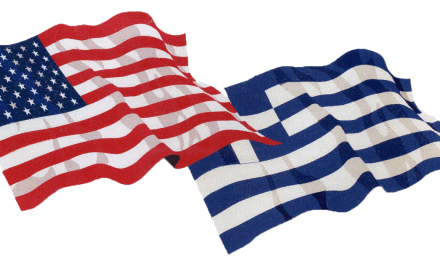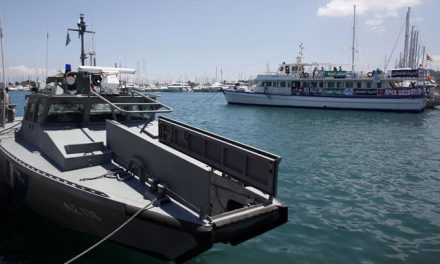By Sarantis Michalopoulos | EURACTIV.com
Hungarian Prime Minister Victor Orbán produced a video message on Saturday (2 June) supporting the efforts of Macedonia’s main opposition party to block a solution to the long-standing name dispute with Greece. He praised its refusal to bend “under pressure from foreign powers”.
Thousands of supporters rallied in favour of Macedonia’s nationalist opposition VMRO-DPMNE party (European People’s Party-EPP) in Skopje on Saturday and against the ongoing talks between their government and Athens to find a solution to the name dispute that blocks the country’s entry to NATO and hopes of joining the EU.
In his video message, Orbán, who is also an EPP member, hailed the party’s “wise and courageous leaders… who won’t bend under pressure from foreign powers”.
The negotiations between the former Yugoslav Republic of Macedonia (FYROM) and Greece are at an “advanced” stage while some technical details are still pending.
Greece wants an agreement on a compound name with a geographical or time qualifier that will apply to everyone, in order to support a solution and the integration of FYROM in NATO and the EU.
A sad exception
European Parliament Vice-President Dimitris Papadimoulis told EURACTIV that almost all EU political leaders, and the overwhelming majority of MEPs, support the Tsipras-Zaev efforts to finally resolve this 25-year dispute.
“A name for all uses, with real changes, in order to bring an end to irredentism and possible future disputes,” he said.
The Greek government has repeatedly asked FYROM to amend the articles of its constitution of irredentist nature to ensure it has no claims on Greek territory.
This is something that Elmar Brok (EPP), a close ally of Chancellor Angela Merkel, has also asked for.
In a recent interview with EURACTIV, Brok noted that it would be helpful for the Skopje government to understand that they have to tell Greece clearly that there is no irredentism, which is the “root cause of the problem”.
Papadimoulis, a close ally of Greek premier Alexis Tsipras, noted that Orban was a “sad exception”.
“Orban once again undermines the promotion of solutions that serve Greece, Skopje and the stabilisation of the Balkan region as well as the European perspective itself.”
“I expect Mr Joseph Daul to reiterate his position because the ‘orbanisation’ of the EPP not only harms democracy and Europe but also the EPP itself,” the leftist MEP warned.
EPP leader Joseph Daul told EURACTIV in January, “I hope that a mutually acceptable solution will be found and we welcome this window of opportunity that could lead to concrete results.”
The statement triggered strong reactions in Athens, with the government accusing the main opposition New Democracy party (EPP) of having different lines on the issue with its European family.
No to erga omnes
The Skopje government might be okay with an “erga omnes” solution. However, this is not the case for the country’s President Gjorge Ivanov, who is an ally of the previous government, led by the nationalist centre-right VMRO-DPMNE, and is also seen as pro-Russian.
The actual name the two governments have agreed on has not been publicised yet; however, Greek newspaper Documento.gr reported on Sunday (3 June) that Tsipras and Zaev have agreed on “Severna Makedonija (Northern Macedonia)”, with an erga omnes usage.
EURACTIV reported in January that the VMRO-DPMNE of former Prime Minister Nikola Gruevski was trying to block talks. As prime minister, Gruevski had taken a hard line on the issue and negotiations were frozen for many years.
Hristijan Mickoski, the current VMRO-DPMNE leader, said on Saturday his party would oppose any constitutional change relating to the country’s name and called for a snap election.
In a statement, the Social Democratic Union of Macedonia (SDSM) accused Mickoski of following the path set by Gruevski.
“Mickoski’s vision is the division and the past. Mickoski must understand that Macedonia has only one vision, and this is a future of prosperity, economic growth and membership in the EU and NATO,” the SDSM party said.
At the recent EU-Western Balkans summit in Sofia, Greek PM Alexis Tsipras told EURACTIV the stance of opposition parties’ in both countries was “a critical issue”.
“Not so much for us, but for the domestic affairs of our neighbour, as our position requires a constitutional change [in Macedonia] which needs qualified majorities. So yes, it was one of the points of discussion between us,” Tsipras emphasised.
In Greece, the opposition New Democracy party has not made its position clear regarding the inclusion of “Macedonia” in the new name.
The right-wing party accuses the government of “secretive talks” and on Sunday opposed any agreement with FYROM that includes a “Macedonian ethnicity and language”.
The government says the opposition has two lines: one set by former New Democracy Prime Minister Costas Karamanlis, suggesting a geographical indication before the term Macedonia, and another one that rejects the term Macedonia altogether.
In the meantime, backers of a solution without including the term Macedonia are organising protests in Greece.
New Democracy Vice-President Adonis Georgiadis noted yesterday that the party does not participate in the protests but said its lawmakers and members could “participate at will”.
“New Democracy leader Kyriakos Mitsotakis should finally decide on his party’s line: does he agree with Joseph Daul and Costas Karamanlis or with the Orban-Georgiadis fraction?” Papadimoulis told EURACTIV.


















